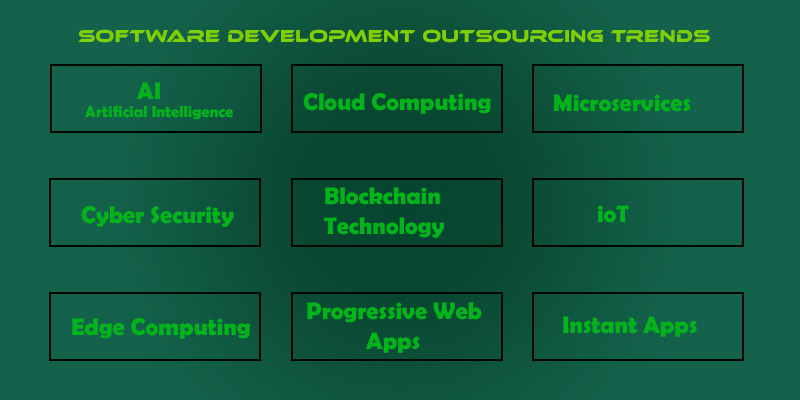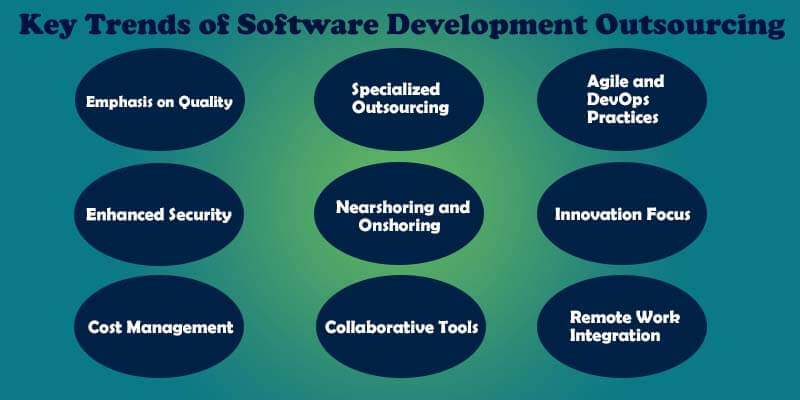Software Development Outsourcing Trends – Current and Future Trends
Software Development Outsourcing Trends are rapidly evolving, reflecting changes in technology and global business practices. Companies are increasingly turning to outsourcing to access specialized skills, reduce costs, and enhance flexibility. As these trends continue to grow, understanding the latest developments becomes essential for staying competitive. Let’s explore the key trends shaping the future of software development outsourcing.
TL;DR
Software Development Outsourcing Trends
| ➦What are Software Development Outsourcing Trends? ➦Specialization is in Demand: Software Outsourcing Trends ➦Key Trends of Software Development Outsourcing ➦Software Development Outsourcing Services ➦Navigating the Latest Outsourcing Trends in IT and Software Development ➦Some Curious Questions’ answers to know ➦Frequently Asked Questions |
What are Software Development Outsourcing Trends?
Software Development Outsourcing Trends refer to the emerging patterns and practices within the industry where companies delegate software development tasks to external service providers. This approach allows businesses to leverage global talent, reduce operational costs, and focus on core activities. By understanding these trends, companies can better navigate the dynamic landscape of technology and outsourcing.
Now, we will try to find out the key trends to shaping the future of software development outsourcing.
Read more: Custom Software Development
Specialization is in Demand: Software Outsourcing Trends

The demand for specialization is shaping software outsourcing trends, with companies increasingly seeking experts in various advanced technologies.
AI (Artificial Intelligence):
AI is at the forefront, offering enhanced analytics and automation capabilities that drive efficiency and innovation. Businesses are using AI to streamline operations, improve decision-making, and create personalized customer experiences.
Cloud Computing:
Cloud computing continues to be vital, providing scalable and flexible solutions that support dynamic business needs. This technology allows companies to store and manage data more effectively, reduce IT costs, and enhance collaboration across different locations.
Microservices:
The shift towards microservices architecture allows for modular, agile, and efficient software development, making it a popular choice. Microservices enable developers to build and deploy small, independent components that work together seamlessly, improving scalability and resilience.
Cyber Security:
Cyber security remains a critical focus due to the growing threats and the need to protect sensitive data. Companies are prioritizing cybersecurity to safeguard their operations against breaches and ensure compliance with regulations.
Blockchain Technology:
Blockchain technology is being leveraged for its secure and transparent transaction capabilities, revolutionizing sectors like finance and supply chain. Blockchain offers decentralized and immutable records, enhancing trust and reducing fraud.
ioT:
The IoT (Internet of Things) is expanding, connecting devices and systems to create smarter environments, necessitating specialized knowledge in this area. IoT solutions are used to optimize operations, improve asset management, and create new customer experiences.
Edge Computing:
Edge computing is emerging to enhance real-time data processing and reduce latency by bringing computation closer to data sources. This trend is critical for applications that require immediate data processing, such as autonomous vehicles and smart cities.
Progressive Web Apps:
The rise of Progressive Web Apps (PWAs) and Instant Apps is transforming user experiences, offering fast, reliable, and engaging mobile interactions without the need for full installations. PWAs and Instant Apps combine the best features of web and mobile apps, providing users with seamless and responsive experiences.
These specialized areas are crucial in software development outsourcing as businesses aim to leverage cutting-edge technology to stay competitive and innovative. The emphasis on these software outsourcing trends highlights the need for outsourcing partners with deep expertise in these domains, ensuring that companies can harness the full potential of modern technological advancements.
Read more: Best Web Development Companies
Key Trends of Software Development Outsourcing

Understanding the key trends in software development outsourcing is essential for businesses looking to stay competitive and innovative. These trends highlight shifts in quality focus, specialization, and collaboration methods. Let’s explore how these trends are shaping the future of outsourcing.
1. Emphasis on Quality
Companies now prioritize quality over cost in their outsourcing strategies. Instead of simply looking for the cheapest option, they seek skilled developers who can produce high-quality software. For instance, a business might choose a more expensive vendor in Eastern Europe because their developers have a track record of delivering reliable and robust applications. This shift ensures better product reliability and customer satisfaction, ultimately leading to stronger market positions and higher customer loyalty.
2. Specialized Outsourcing
The demand for specialized services is on the rise. Businesses increasingly look for providers with expertise in cutting-edge technologies like AI, blockchain, and IoT. For example, a healthcare company might outsource to a provider specializing in AI to develop advanced diagnostic tools. By leveraging these specialized skills, companies can stay ahead in their respective fields and integrate the latest technological advancements into their products and services.
3. Agile and DevOps Practices
The adoption of Agile and DevOps methodologies is becoming widespread among outsourcing partners. These practices enhance collaboration, speed, and flexibility, leading to more efficient development processes. For example, a tech startup might work with an outsourcing firm that uses Agile methodologies to ensure rapid iteration and continuous improvement of their mobile app, enabling them to quickly respond to user feedback and market changes.
4. Enhanced Security
With the rise in cyber threats, there is a stronger focus on security within the outsourcing industry. Outsourcing partners are now expected to follow stringent security protocols to protect sensitive data. For instance, a financial services firm outsourcing software development will prioritize vendors who can demonstrate compliance with international security standards such as ISO/IEC 27001, ensuring their customers’ data remains safe and secure.
5. Nearshoring and Onshoring
Businesses are increasingly opting for nearshoring and onshoring instead of offshoring. This approach reduces communication barriers and aligns better with time zones, improving project management. For example, a U.S. company might choose to nearshore its software development to Mexico, benefiting from cultural similarities and convenient time zone overlap, which facilitates smoother and more effective collaboration.
6. Innovation Focus
Companies outsource to drive innovation and bring fresh perspectives to their projects. By partnering with external teams, they can quickly integrate new ideas and technological advancements into their products. For instance, a retail company might collaborate with an innovative tech firm in India to develop a new augmented reality shopping experience, enhancing customer engagement and differentiating themselves in the market.
7. Cost Management
While quality is crucial, cost management remains an important factor in outsourcing decisions. Businesses seek cost-effective solutions that balance budget constraints with project needs without compromising quality. For example, a startup might outsource to a reputable development firm in Southeast Asia, where they can get high-quality work at a fraction of the cost compared to local developers, allowing them to allocate resources efficiently.
8. Collaborative Tools
The widespread use of collaborative tools like Slack, Jira, and Trello has revolutionized remote work and outsourcing. These tools enhance communication and project tracking, making remote collaboration more effective. For instance, a marketing firm outsourcing its web development can use these tools to maintain constant communication and monitor progress, ensuring that the project stays on track and any issues are promptly addressed.
9. Sustainable and Ethical Practices
There is a growing emphasis on sustainability and ethical practices in the outsourcing industry. Companies prefer partners who follow environmentally friendly and ethical standards, aligning with their corporate values. For example, a tech giant like Google might choose to work with outsourcing firms that use renewable energy and adhere to fair labor practices, reflecting their commitment to corporate social responsibility.
10. Remote Work Integration
The pandemic has accelerated the shift to remote work, making it a permanent fixture in many industries. Outsourcing partners are now adept at integrating remote teams, ensuring seamless development processes despite geographical distances. For example, a software company might seamlessly integrate remote developers from an outsourcing firm into their existing teams, using robust remote collaboration tools and practices to maintain productivity and cohesion.
11. Integration of Artificial Intelligence and Automation
The integration of artificial intelligence (AI) and automation in outsourcing processes is becoming more prevalent. Companies are leveraging AI to streamline tasks such as code review, testing, and maintenance, reducing human error and increasing efficiency. For instance, an outsourcing partner might use AI-powered tools to automate routine tasks, allowing developers to focus on more complex and creative aspects of software development. This trend not only accelerates project timelines but also enhances the overall quality of the software.
These trends we discussed highlight how the landscape of software development outsourcing is evolving, focusing on quality, specialization, and effective collaboration to drive future success. Anyway, by understanding and leveraging these trends, businesses can make informed decisions and remain competitive in the ever-changing technology market.
Read more:
Software Development Outsourcing Services

Software Development Outsourcing Services enable businesses to access top-tier development talent globally, ensuring high-quality and cost-effective solutions.
By outsourcing software development, companies can leverage specialized expertise in areas such as custom software development, application maintenance, and technology consulting. These services offer flexibility and scalability, allowing businesses to quickly adapt to changing market demands.
Additionally, outsourcing partners often bring innovative approaches and advanced technologies like cloud computing, AI, and blockchain to the table, enhancing the overall efficiency and effectiveness of software projects.
By utilizing offshore or nearshore development teams, companies can focus on their core activities while maintaining competitive advantage and accelerating their digital transformation efforts.
Navigating the Latest Outsourcing Trends in IT and Software Development

In today’s fast-paced technological landscape, staying updated on the latest outsourcing trends is crucial for maintaining a competitive edge. Businesses are increasingly focusing on outsourcing software development trends to leverage global talent and advanced technologies.
Analyzing the IT outsourcing trend reveals a significant shift towards agility and efficiency, driven by the need for specialized skills and cost savings.
As companies delve deeper into IT outsourcing trends, they discover innovative ways to enhance productivity and streamline operations. Keeping a pulse on the trends in IT outsourcing ensures that organizations can adapt to the evolving market demands.
Moreover, understanding outsourcing IT trends helps businesses mitigate risks and improve service delivery. The landscape of software outsourcing trends highlights the importance of strategic partnerships in achieving technological advancements and operational excellence.
Some Curious Questions’ answers to know:
Why is business process outsourcing growing?
Business process outsourcing (BPO) is growing because it helps companies reduce costs, improve efficiency, and focus on core activities. By outsourcing non-core functions such as customer service, HR, and accounting, businesses can save money and resources. Additionally, BPO providers often have specialized expertise and technology that can enhance the quality and speed of these processes. This allows companies to remain competitive and agile in a fast-changing market.
Why is outsourcing more common?
Outsourcing is more common because it offers numerous benefits like cost savings, access to global talent, and increased flexibility. Companies can leverage the expertise of external providers, reduce overhead costs, and scale operations up or down based on demand. This approach allows businesses to focus on their core competencies while outsourcing specialized tasks to experts, leading to better overall performance and efficiency.
What are the reasons for outsourcing?
There are several reasons for outsourcing. Cost reduction is a primary factor, as outsourcing can lower labor and operational costs. Access to specialized skills and advanced technology is another reason, enabling companies to enhance their capabilities without significant investment. Outsourcing also provides flexibility in scaling operations and allows businesses to focus on core activities. Additionally, it can improve risk management by sharing responsibilities with outsourcing partners.
Why is outsourcing happening?
Outsourcing is happening due to the need for cost efficiency, access to specialized skills, and the desire to focus on core business functions. Companies face increasing pressure to innovate and remain competitive, which drives them to seek external expertise. Outsourcing helps businesses manage resources better, streamline operations, and adapt quickly to market changes. It also allows for better allocation of internal resources towards strategic initiatives.
How big is the software development outsourcing market?
The software development outsourcing market is substantial and continues to grow. As of 2023, the market size was estimated to be around $92.5 billion. This growth is driven by the increasing demand for software development, the need for digital transformation, and the expansion of technology sectors globally. Companies across various industries are outsourcing software development to leverage specialized skills, reduce costs, and accelerate time-to-market.
What is software development outsourcing?
Software development outsourcing involves contracting external service providers to handle software development tasks. This can include everything from custom software creation to application maintenance and support. Businesses outsource these tasks to gain access to a larger talent pool, utilize advanced technologies, and improve project efficiency. Outsourcing can be done onshore, nearshore, or offshore, depending on the company’s needs and preferences.
Why is there a growing trend in outsourcing?
There is a growing trend in outsourcing due to several factors. The need for cost savings, access to specialized expertise, and the ability to scale operations quickly are major drivers. Additionally, advancements in communication and collaboration technologies have made it easier to manage outsourced projects effectively. Companies also seek to mitigate risks and improve flexibility by outsourcing non-core activities to trusted partners. Read more.
What is the growth pattern of outsourcing?
The growth pattern of outsourcing shows a steady increase, driven by the need for cost efficiency and access to global talent. More companies are adopting outsourcing strategies to focus on their core competencies. Technological advancements, such as cloud computing and AI, are also facilitating this growth by making it easier to manage and integrate outsourced services. The market is expanding across various sectors, including IT, healthcare, finance, and customer service.
What is the rise of outsourcing?
The rise of outsourcing refers to the increasing adoption of outsourcing practices across different industries. This rise is fueled by the need for businesses to reduce costs, improve efficiency, and access specialized skills. Outsourcing allows companies to delegate non-core tasks to external providers, enabling them to focus on strategic activities. The availability of advanced technology and improved communication tools has further accelerated this trend.
Is outsourcing a method of growth?
Yes, outsourcing is a method of growth. It enables companies to expand their capabilities and enter new markets without significant investment in infrastructure or human resources. By outsourcing non-core functions, businesses can allocate more resources to innovation and strategic initiatives. This approach helps companies scale operations, improve efficiency, and stay competitive, contributing to overall growth.
What is the main point of outsourcing?
The main point of outsourcing is to enhance efficiency and reduce costs by leveraging external expertise. It allows businesses to focus on their core activities while delegating non-core tasks to specialized service providers. This strategy helps companies achieve better performance, access advanced technologies, and remain competitive in their industry.
What is outsourcing strategy?
An outsourcing strategy is a plan that outlines how a company will use external service providers to perform specific business functions. This strategy involves identifying which tasks to outsource, selecting the right partners, and managing the outsourcing relationship effectively. The goal is to achieve cost savings, improve service quality, and focus on core business activities. An effective outsourcing strategy aligns with the company’s overall objectives and ensures that outsourced services contribute to its success.
Frequently Asked Questions:
Q1: What are the primary benefits of outsourcing?
A1: Cost savings, access to specialized expertise, and increased flexibility are the primary benefits of outsourcing.
Q2: How does outsourcing help companies focus on core activities?
A2: Outsourcing allows companies to delegate non-core tasks to external providers, freeing up resources to focus on core activities.
Q3: What drives the growth of the outsourcing market?
A3: The need for cost efficiency, access to global talent, and advancements in technology drive the growth of the outsourcing market.
Q4: What factors should companies consider when choosing outsourcing partners?
A4: Companies should consider factors such as expertise, track record, cultural compatibility, and communication capabilities when choosing outsourcing partners. Learn more.
Q5: How does outsourcing contribute to business growth?
A5: Outsourcing contributes to business growth by enabling companies to expand capabilities, improve efficiency, and focus on strategic initiatives while reducing costs.
Wrapping Up:
In wrapping up, the exploration of Software Development Outsourcing Trends underscores the imperative for businesses to adapt and capitalize on emerging shifts in the industry. Staying attuned to these trends empowers companies to optimize their outsourcing strategies, enhancing competitiveness and fostering innovation. As Software Development Outsourcing Trends continue to shape the landscape, proactive engagement and strategic alignment with these dynamics will be key to sustaining growth and relevance in the dynamic global marketplace.






